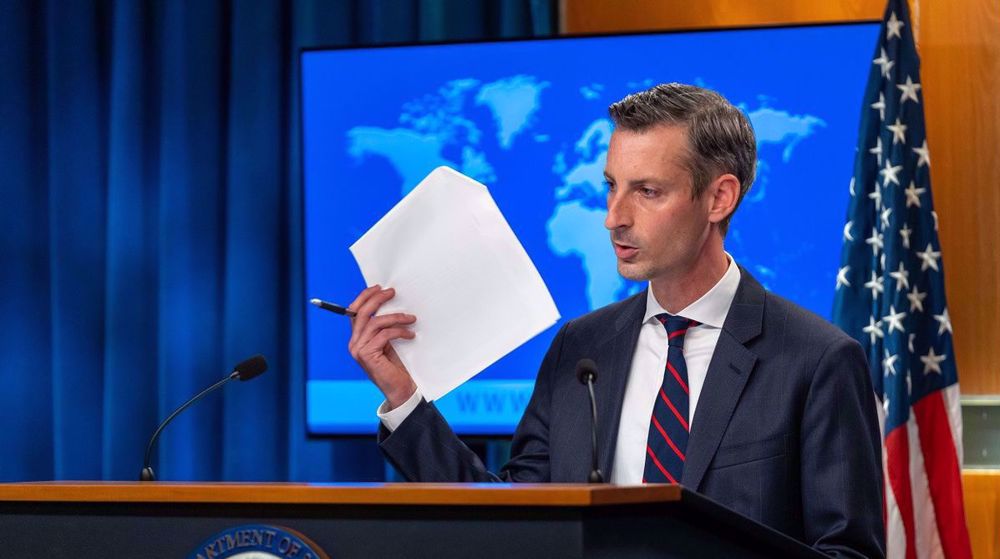Alwaght- Number of attacks against American forces went up 400 percent in after the assassination of Iran’s top anti-terror General Qassem Soleimani and the broader “maximum pressure” campaign that the United States launched against the Islamic Republic in 2018.
Speaking at a press briefing on Thursday, US State Department spokesman Ned Price said between 2019 and 2020, the number of attacks from what he called Iran-backed groups in Iraq went up 400 percent.
“This was in the aftermath of the decision to abandon the JCPOA,” Price said, using an acronym for the Joint Comprehensive Plan of Action (JCPOA), or the Iran deal, which the US left in May 2018 in pursuit of the so-called maximum pressure policy.
“It was in the aftermath of the decision to apply the [foreign terrorist organization] designation to the [Islamic Revolution Guards Corps]. It was in the aftermath of the killing of Soleimani, the IRGC [Quds Force] chief,” he said.
According to Price, in almost everything that the former US administration’s Iran policy promised, “the exact opposite has come to fruition.”
Washington designated the IRGC as a foreign terrorist organization in April 2019, only a few months before the US military carried out a Trump-ordered terrorist attack in Baghdad, Iraq, that led to the martyrdom of General Soleimani, who had played a major role in the defeat of Daesh terrorist group in the Arab country in 2017.
Following the attack – which also led to the martyrdom of Abu Mahdi al-Muhandis, deputy commander of Iraqi resistance group PMU – Iran and Iraqi resistance groups vowed to exact vengeance on the aggressors and expel the US military from the region.
As part of that revenge, Iran launched a volley of ballistic missiles at two US-run bases in Iraq. As a result of the attack, codenamed Operation Martyr Soleimani, 110 American forces were suffered traumatic brain injuries. Iran also vowed to hunt down the perpetrators, including the operators and commanders, behind the assassination.
For their part, Iraqi resistance groups have been fighting back against the US occupation force, conducting recurrent attacks against American bases and positions in the aftermath of the assassination.
In a report dated February 14, the US State Department said it was paying more than $2 million per month to provide 24-hour security to former Secretary of State Mike Pompeo, one of the key perpetrators.
According to the leaked report, the cost of protecting Pompeo and former Iran envoy Brian Hook between August 2021 and February 2022 amounted to $13.1 million.
Vienna talks in limbo
In his Thursday briefing, Price also expounded on the latest developments around the diplomatic efforts in Vienna to bring the US back into full compliance with the JCPOA and repeal its maximum pressure policy under the Joe Biden administration.
As always, he noted some progress in recent weeks, saying there are a small number of outstanding issues, but shifted the blame on Iran for the failure to reach an agreement to restore the JCPOA.
He added the US now believes that a revived JCPOA “would bring with it non-proliferation benefits that would be in our interest, in the interests of our allies and partners – our allies in Europe, the E3 that’s part of the P5+1, our allies and partners around the world who are not part of the P5+1.”
Iran says Washington’s indecisiveness is to blame for the protraction of the talks, as a number of key issues remain unresolved, ranging from the removal of all post-JCPOA sanctions to the provision of guarantees by the American side that it will not leave the deal again.
Days earlier, US Special Envoy for Iran Robert Malley said the IRGC will remain sanctioned as he noted that a deal in Vienna was not “inevitable” and not “just around the corner.”
“In any negotiations, when there’s issues that remain open for so long, it tells you something about how hard it is to bridge the gap,” he added.
Iranian Foreign Minister Hossein Amir-Abdollahian has said one of the key issues facing the deal is the removal of the IRGC from the US blacklist.
‘Even closest family members fight’
Price was also asked to comment on disagreements between the US and Israel regarding the JCPOA.
“It, of course, is no secret that we have tactical differences with our Israeli partners,” Price said, explaining that there is no “strategic disagreement” between Washington and Tel Aviv on reviving the Iran deal.
He added, “Families – even the closest family members sometimes have disagreements and arguments. The ability for close family members to do that is I think a testament to the closeness, and that’s how we look at that dynamic here in this case.”
Citing informed sources, the US-based news outlet Axios reported on Wednesday that US Secretary of State Antony Blinken asked Bennett and other Israeli officials for their alternative to the JCPOA.
According to the report, Bennett told Blinken that the JCPOA will only be “a Band-Aid” solution for just a few years.
Price explained that Blinken’s recent visit to Israel was “part and parcel of our regular efforts to keep our allies and partners around the world, as well as Congress here at home, informed of” efforts to revive the JCPOA.
The Israeli regime, under both Benjamin Netanyahu and Naftali Bennett, has been vocal in its opposition to a US return to the deal. In 2015, Israel lobbied aggressively to prevent the signing of the JCPOA but it failed. In 2018, it cheered Trump’s decision to scrap the deal.



























